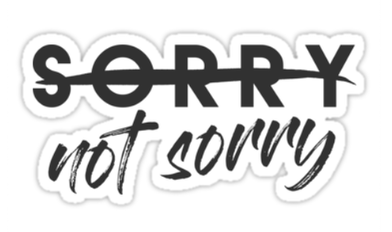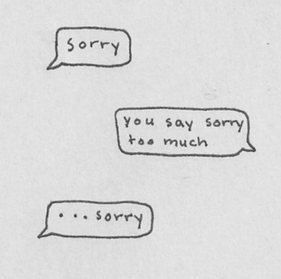 I’m sorry I’m late. I’m sorry I have been so needy lately. I’m sorry to ask for another favor. I’m sorry I made a mistake. I’m sorry I can’t make it tonight. I’m sorry I’ve been so emotional. And my favorite, “I am sorry for being in the way”, often said as you wander down the grocery store aisle. Why are we apologizing for walking down an aisle? Is it because we may be getting in the way of the person who is considering the box of Pho Xao or Pad Thai (what is the difference anyway?) and you might be blocking their view for the split second you walk between them and the boxed rice noodles? Or is it because you are unintentionally apologizing for “being”? Either way, I appreciate a bit of kindness…trust me, I am the first to extend a hand to someone, open a door, or give up my seat in a waiting room for someone in more need than me. But by saying “I am sorry” for something that I am really not sorry about, am I disempowering myself? Are we being too kind to others, taking away our own chance to be kind to ourselves? How many times do YOU think YOU say “I am sorry” in a day? Take a wild guess? According to a great new survey from Express.co.uk, they found that the average person apologizes approximately 2,920 times every year. That means, eight “I’m sorrys” every single day, that’s 56 apologizes every week and that’s somewhere around 250,000 apologies in a lifetime. There’s more. The survey also found that about one in eight people apologize at least 20 times a day. And, 43% of people admit that they regularly apologize when other people do something wrong to them like someone bumps you on the sidewalk and even though it clearly wasn’t your fault, you say “I’m sorry.” What are you really saying when you say “I’m sorry”? On the surface, “I’m sorry,” may sound like an apology, but I wonder if it may actually be disguising other feelings. For example, the person who apologizes routinely and reflexively when no real offense has occurred, because they believe that they have burdened someone, which is a feeling they have difficulty tolerating. Frequently heard examples of this are “I’m sorry, but I need to use your bathroom,” or, “Sorry, do you know what time it is?” Another example of “I’m sorry” may be used to give the apologizing person permission to say or do something that he or she believes might be objectionable to another, but to be able to do it anyway. Somehow, it seems, saying “I’m sorry” softens the blow or reduces the likelihood of consequences. But for me, what it seems to do is “lessen” our actions…common actions that don’t actually need “Sorry” as the start of the sentence. How much of an objection is to ask someone the time? I mean, really? The time? It is not like you are saying, “I’m sorry, although I would like to know the time, can you actually give me your Shinola watch?” But you aren’t asking for their watch…you are asking for the time. Time is free. Their Shinola watch is not. So why are you sorry for asking for something simple like the time? As a Coach, I hear “sorry” more than I hear any other word from my clients. I am hyper vigilant when it comes to that word, because I truly believe it gives me a sense of what my Client’s self-esteem is like. The more often, the less self-esteem. And I wonder how that shows up in their professional work during work meetings, during interviews, or during conversations with their managers. By saying “sorry” when they have nothing to actually be sorry about, is it annoying as well? Annoying or not, I am a firm believer that it is doing harm to one’s confidence and ability to “own” who they are. Ultimately affecting their professionalism at work. Are we lessening the impact of future apologies? Another insight is that by “over sorry-ing”, we may actually be NOT be saying sorry when we really should or when we do, people don’t feel the impact of a “real sorry.” Is saying sorry like willpower where we only have so many and we run out, misusing our “sorrys” on things we don’t have to be sorry about? When we say “I’m sorry” all the time, when do those around us actually know when we are generally sorry for something? Is it a bit like the boy calling wolf? When you mean it, they might think it is you saying “I’m sorry” reactively again. And it lessens the actual apology. Sorry…I am not sorry. Demi Lovato can all teach us something – stop apologizing so much about things you didn’t do that you seem to think requires an apology! So, what can we say instead of sorry next time? How about: I’m sorry I’m late. Thank you for waiting on me. I’m sorry I have been so needy lately. Thank you for being there for me. I’m sorry to ask for another favor. Thank you for helping me out. I’m sorry I made a mistake. Thank you for pointing out my mistake. I’m sorry I can’t make it tonight. Thank you for inviting me. I’m sorry I’ve been so emotional. Thank you for loving me. I’m sorry for being in the way. Good luck choosing your dinner! I’d go with the Pad Thai. What does it take to stop “over sorry-ing”? Awareness. No need to say “sorry, I’m saying sorry…” every time you say sorry. Just be aware of what you are saying and that’s enough. And soon enough, what you really want to say will start to come more naturally than your “sorry” reflex. FYI – I said sorry 51 times in this blog post. Not sorry, AM Comments are closed.
|
AuthorThe authors of these blogs include incredible Coaches and Writers at FromWithin Coaching who are inspired to share their thoughts, ideas, comments, and possibilities with YOU, the reader. Archives
June 2025
Categories
All
|


 RSS Feed
RSS Feed